Gibbs a two-sport star at Ole Miss.
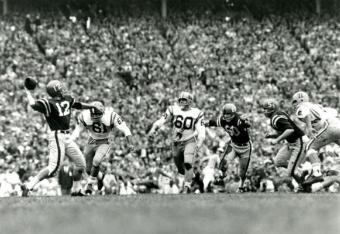
Few people have contributed more heart and soul to Ole Miss than Mr. Jake Gibbs.
Through his unwavering commitment, dedication and love of all things Ole Miss, Gibbs has become a Rebel treasure.
With the current buzz surrounding the Rebel football program, now is the perfect opportunity to reflect on the career of a man that helped shape Ole Miss athletics for decades.
Recently, I was afforded an opportunity to visit and talk sports with the living legend. It was like sitting down for a history lesson with your grandfather, as the warm, outgoing family man remembered dates, scores and conversations as if everything he recalled happened yesterday.
At 74 years old, the Grenada, MS native has officially been part of the Ole Miss family since first signing to play football in the late 1950’s. While initially recruited to only play football, he let recruiters know of his desire to play both football and baseball from day one.
Not only did Ole Miss push hard for Gibbs’ services, but so did folks in Starkville. Fortunately for Rebel fans, a home game on November 15, 1952 ultimately helped seal the deal for Ole Miss.
Gibbs recalled, “When I decided to play football in college, it was the 1952 Ole Miss, Maryland game with QB Jimmy Lear that made up my mind. When Ole Miss beat Maryland, it really put Ole Miss on top nationally.”
Thanks to the program-building win in 1952, coach John Vaught landed an eventual Rebel great.
Gridiron Greatness
A two-time national champion at Ole Miss (1959 and 1960), Gibbs went a combined 23-3-1 while playing QB in coach Vaught’s motion offense. Gibbs said of playing for Vaught, “I really loved him, and everyone respected him.” The two shared a special relationship which translated into incredible success on the field.
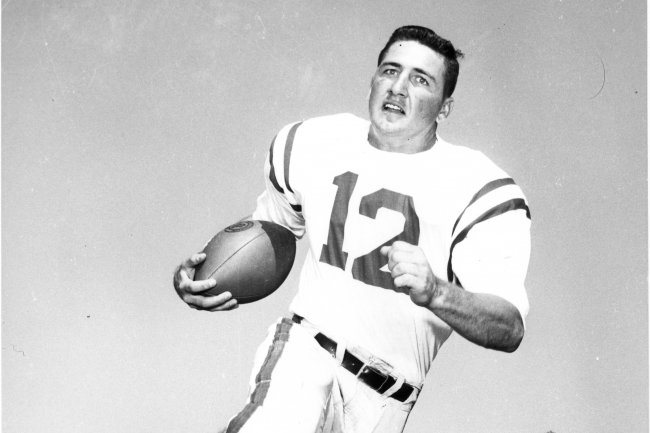
While the Rebs went 9-2 in 1958, including a win over Florida in the Gator Bowl, 1959 would serve as Gibbs’ coming out party. As a junior in 1959, he helped his club earn a share of the national championship with a 21-0 win over LSU in the Sugar Bowl.
During that special season, Gibbs remembered a classic Vaught moment.
He recalled, “We played Arkansas at Crump Stadium in Memphis. He (Vaught) gave one hell of a pre-game motivational speech, and got the locker room shaking. It was one of the best I’ve ever heard.” The riveting pep talk carried over to the field, as Ole Miss topped the Hogs 28-0 that day.
Leading the SEC in both passing and total offense in 1959, Gibbs was a first-team All-SEC selection. Later, he would go on to become part of the 1959 SEC Team of the Decade.
As good as 1959 was for the standout, Gibbs’ senior year would cement his legacy as an Ole Miss great. A co-captain with guard John Warner Alford Jr. in 1960, Gibbs led the Rebels to a 10-0-1 record with a win over Rice in the Sugar Bowl (scoring both Rebel touchdowns in the game). In leading his team to victory, Gibbs received the Miller-Digby Award as the game’s most outstanding player.
1st Quarter Sugar Bowl Highlights (courtesy: SugarBowlClassic)
Not only was the senior named a 1960 All-American and the SEC Back and Player of the Year, but he also finished third place for the Heisman Trophy. However, it was much harder to gain recognition as a potential Heisman candidate during his playing days than it is today.
Along those lines, Gibbs credits former Ole Miss sports information director Billy Gates for truly getting his name on the Heisman ballot by mailing out countless promotional letters. Minus the major media coverage surrounding the Heisman today, Gibbs said he actually discovered his finalist status one day while reading a newspaper.
Having been a part of countless special games over his career, I asked Gibbs what games stood out as the most memorable (minus the 1959 Halloween night game). With a mind like a steel trap, he quickly recounted three contests. “I had a good game at Mississippi State my junior year. We beat them 42-0. I remember Tennessee my senior year. We won 24-3, and hadn’t won in Knoxville before then for a long, long time. Then we played Arkansas in Little Rock my senior year and won 10-7.”
Diamond Dominance
While Gibbs excelled at football, the 1960 and 1961 All-American was equally as impressive on the baseball field. In fact, he became a legend at both in Oxford.
During his pursuit by then-football recruiting coordinator and baseball coach Tom Swayze, Gibbs remained up front with Vaught and Swayze about his desire to play both sports.
It’s a good thing coaches listened, as Gibbs helped Ole Miss capture its first SEC Baseball Championship in 1959. The very next season, the Rebels won another SEC Championship. To this day, his batting average still hovers near the top of Ole Miss record books.
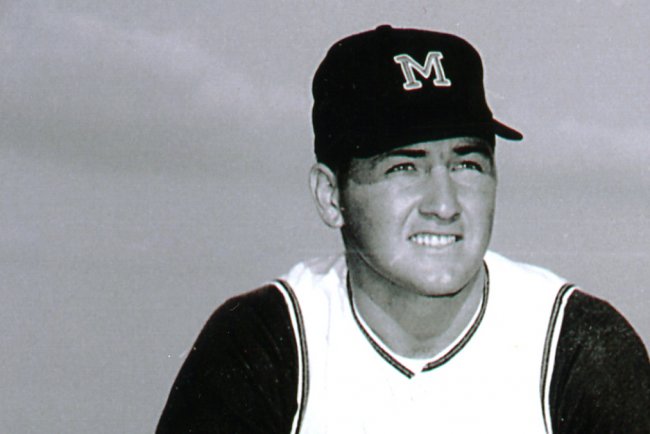
In 1961, the two-sport star was drafted by the New York Yankees.
As a Yankee, he would enjoy a 10-year career in the big leagues. New York management moved him to catcher, where he would eventually start in between the careers of Yankee catchers Elston Howard and Thurman Munson.
It wasn’t soon after his 1971 retirement that Ole Miss would call him home. He noted, “Ole Miss rubs off on you, and you don’t realize how good you’ve got it until you’re gone. People leave and say ‘God I miss that place.’”
Soon after his playing career ended, Gibbs returned to Ole Miss to coach the diamond Rebs after coach Swayze retired. Compiling a career coaching mark of 485-389-8, Gibbs sits only behind Mike Bianco as the all-time winningest Rebel baseball coach.
Due in part to taking his team to the 1972 College World Series (the last time Ole Miss reached the CWS), Gibbs was named 1972 SEC Coach of the Year. A few years later in 1977, he would claim the award for a second time.
Today, more than one Gibbs can be found around Swayze Field in Oxford. Redshirting this season, Gibbs’ grandson, Luke Gibbs, hopes to make a splash as an infielder in the not-too-distant future.
Once a Rebel, Always a Rebel
On a visit to Oxford one Yankee offseason, Gibbs decided to watch Vaught’s Rebels practice one afternoon from afar. When the head coach caught a glimpse of his former QB, he quickly motioned for Gibbs to join him down on the field.
Frustrated with his quarterbacks’ inability to get to the outside, Vaught told Gibbs, “Show them how to run 36 Slant.” Not wanting to interrupt the flow of practice, Gibbs kindly told his coach that he’d prefer to just watch.
Gibbs recalled that without hesitation Vaught shouted, “I don’t give a damn, show ‘em how it’s done.” From that day forward, the two-time national champion would help coach Rebel quarterbacks in Oxford when he wasn’t playing baseball.
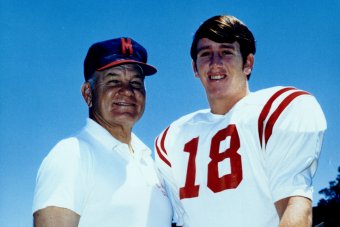
While he developed a number of Rebel signal-callers, the player he impacted the most was likely 1970 Heisman Trophy finalist Archie Manning. Ironically, Manning went on to finish third for the Heisman (as would son Eli in 2003), just like his coaching mentor in 1960.
Today, Gibbs lives right around the corner from the Eli’s offseason home in Oxford. Who knows, maybe the younger Manning will also help develop Rebel quarterbacks once his playing career ends?
Looking Towards the Future
As our conversation neared an end, the topic shifted to the current state of Ole Miss football.
Reflecting on last season Gibbs said:
“When the season started, I don’t think a lot of people knew what to expect. That staff did one of the best jobs anywhere. I was so proud of them. The kids came in and understood what he (Freeze) was all about, how he was going to run things, to go to class and that they’d be held accountable. He did it in a way where players accepted his whole philosophy. He laid the groundwork and they accepted it, and I think you’re going to see the same thing this year.”
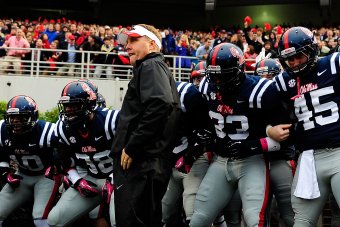
As for what advice he would give to the incoming recruiting class, he suggested:
“They (incoming recruits) need to get adjusted to college life as quick as they can, with an understanding they are student-athletes and will be held to standards as a football player and a student. Keep your nose clean. Stay out of trouble and just do your job.”
Gibbs certainly did his job in school, and he’ll forever be remembered as one of the greatest Rebels of all-time. In fact, no student-athlete may ever again leave the type of legacy Gibbs did at Ole Miss.
Jake Gibbs remains the essence of what it truly means to be an Ole Miss Rebel.
— Seph Anderson, Sportswriter to The South, covers timely Ole Miss, SEC, & national news from the sports world. @SephAnderson
